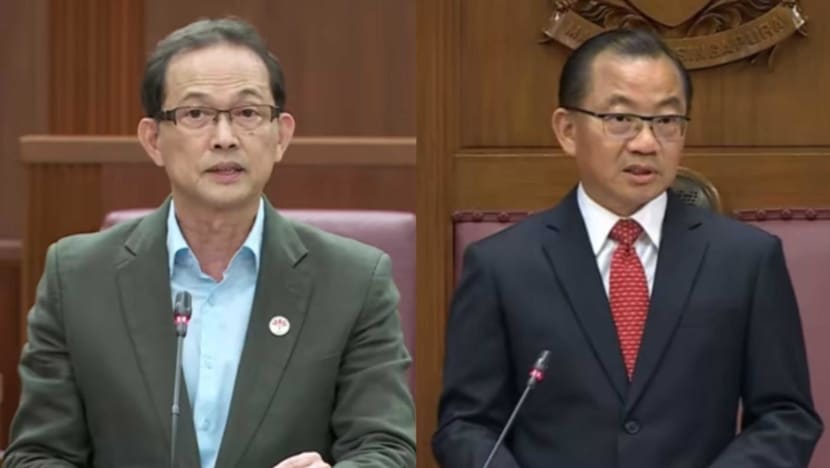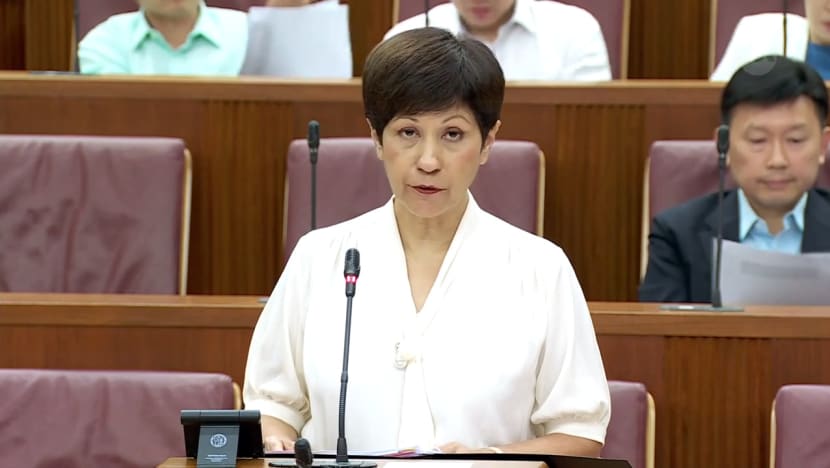Leong Mun Wai's comment about being called last to speak in parliament cast aspersions on Speaker's impartiality: Seah Kian Peng
Opposition politician and Non-Constituency MP Leong Mun Wai said his comment, made during a podcast, was tongue-in-cheek and not ill-intentioned.

Non-Constituency MP Leong Mun Wai (left) and Speaker of Parliament Seah Kian Peng.

This audio is generated by an AI tool.
SINGAPORE: Despite publicly retracting a comment that he made about being called last to speak in parliament, Non-Constituency MP Leong Mun Wai’s words have still cast aspersions on the Speaker’s fairness and impartiality, said Speaker Seah Kian Peng on Tuesday (Jul 2).
Addressing parliament at the start of Tuesday’s sitting, Mr Seah said that while Mr Leong clarified the matter with him and also withdrew his statement, he did not offer an apology.
“Going forward. I would like to warn our members that these are serious matters and that such acts of contempt should not be repeated again, regardless of a member’s intention,” said Mr Seah.
“The proceedings of parliament and the conduct of members being an elected, non-constituency or nominated member, Leader of the Opposition, minister or any other office holder, are not matters which should be taken lightly and cannot be made in jest.”
Mr Leong, a member of the Progress Singapore Party’s (PSP) central executive committee, was interviewed by Yah Lah But podcast hosts Haresh Tilani and Terence Chia for an episode titled “Why Governments Cannot Lead All The Way & Why Gen Z Will Be Successful”.
In that episode released on May 14, Mr Tilani had said: “I mean, at least for (the debates) that we were there, whenever the Speaker says, okay, any questions, you’re one of the first to put your hands up.”
In response, Mr Leong said: “And one of the last to be called.”
NCMP Leong Mun Wai has clarified that his remark on a "Yah Lah BUT" podcast was “tongue-in-cheek” and “light-hearted”, and he had no intention to cast aspersions on the impartiality of the Speaker of Parliament. He also said he was satisfied with the time and opportunities that Mr Seah Kian Peng had given him to ask questions since he took over as Speaker in August 2023. The Speaker had on various occasions called him ahead of other Members, Mr Leong added. However, Mr Leong did not apologise as requested by Mr Seah, saying since it was accepted that there was no intention to cast aspersions, it would “not be accurate to make an apology” that suggests any such intention. The Speaker, who detailed the exchanges between him and Mr Leong in Parliament on Tuesday (Jul 2), told the House that he had given careful and due consideration to the totality of Mr Leong's explanations. Mr Seah warned against engaging in such conduct, whether in jest or otherwise and felt an apology was needed. But he also considered that Mr Leong had agreed to retract the statement that he made on the podcast, made clear that he was satisfied with the time and opportunities given to him to ask questions and had on various occasions been called ahead of other Members, as well as confirmed that he had not been treated differently from other MPs in asking questions. Mr Seah said he is satisfied that Mr Leong's clarifications taken in totality have mitigated the misleading impression of the statement and considers this matter closed. He reminded Members that such acts of contempt should not be repeated again, regardless of the intention. “I trust that all Members will also play their part in upholding the rules of Parliament,” he said.
*Audio issues inherent from source
CLARIFICATIONS OVER EMAIL AND IN PERSON
Following the statement, Mr Seah said he asked for information on the occasions Mr Leong was called upon to ask supplementary questions and make clarifications in parliament, from August 2023 – when he took the role – to May this year.
“The record provides no basis for the statement,” said Mr Seah.
He said that Mr Leong was called earlier than other members “on many occasions” and, as such, his statement was “a gross misrepresentation of the proceedings of parliament”.
“The statement also suggests that Mr Leong is somehow treated differently from other members and that his clarifications and supplementary questions have been deprioritised,” said Mr Seah.
“The statement cast aspersions on my fairness and impartiality in calling members. This is a reflection of my character as the Speaker, touching on my conduct of parliamentary proceedings.”
Mr Seah said he wrote to Mr Leong on Jun 22, asking him for the basis of the statement.
The NCMP replied three days later, explaining that the statement was a tongue-in-cheek comment made to lighten the mood in the context of the podcast, and that he had no intention to question Mr Seah’s impartiality.
He put up a clarification on his Facebook page that same day, where he said: “This was in no way meant to be a comment on Speaker’s impartiality. Speaker has, on various occasions, called me ahead of other members.”
Mr Leong requested to meet with Mr Seah at the next parliamentary sitting to clarify the matter in person, and the duo met on Jun 26.
“I told him that even if he did not intend to cast aspersions on my fairness and impartiality in calling members, the statement does give rise to such an innuendo and reflects on my character in conducting parliamentary proceedings,” said Mr Seah.
While Mr Leong repeated his explanation that the comment was made for the podcast and was not ill-intentioned, Mr Seah told him it “does not change the fact that the statement is attributed to me, that there was no basis for the statement, and it should not have been made”.
After that meeting, Mr Seah asked Mr Leong in an email for a written statement apologising for giving the misleading impression of parliamentary proceedings.
In a Jun 28 response, Mr Leong further explained that during the recording of the podcast, neither his nor Mr Tilani’s comments were scripted nor discussed beforehand. He added that he was satisfied with the time and opportunities given to him to ask questions in parliament.
However, Mr Seah noted that the NCMP’s clarification still did not contain the apologies requested. He then gave Mr Leong a final opportunity to make a written apology.
Mr Leong then said in a Jul 1 reply: “Given that you accept that there was no intention to cast aspersions on your impartiality as the Speaker, I trust you will agree that it would not be accurate to make an apology that suggests an intention to mislead listeners on my part.”
NOT THE FIRST TIME
“Today’s matter is not the first incident relating to Mr Leong,” said Mr Seah.
On Mar 22 last year, Mr Leong, then the secretary-general of PSP, took to Facebook to air his opinions about parliament’s proceedings, after an exchange with Law and Home Affairs Minister K Shanmugam.
Mr Shanmugam had made a ministerial statement three days before, responding to Mr Leong’s question on why Mr Lee Hsien Yang and his wife Lee Suet Fern were named in a police investigation, while those being investigated in the Keppel Marine & Offshore corruption case were not.
The NCMP alleged in his post that the minister’s citing of the Parti Liyani case was an attempt to “muddy the waters”.
He also wrote: “What SM Teo and Minister Shanmugam have done is run the risk of turning Parliament into a platform to colour public opinion on criminal proceedings.”
During a heated exchange in parliament, Mr Leong replied to a clarification from former Speaker Tan Chuan-Jin by saying: “Speaker, if the minister didn’t ask me, I suggest you do not ask.”
He apologised after Mr Tan rebuked him and asked him to retain the decorum of the debate. The NCMP also later deleted the allegations from his Facebook posts.
In March 2022, Mr Leong wrote in a Facebook post that then Speaker Tan Chuan-Jin had not allowed him to speak in parliament using the debate cut-off time “as an excuse”.
At the end of the Ministry of Manpower’s (MOM) Committee of Supply (COS) session, Mr Leong had asked repeatedly to make a clarification following the ministry’s presentation of its programmes, but was told that time was up.
In response the next day, Deputy Leader of the House Zaqy Mohamad said his comments were in contempt of parliament, and “impugned the Speaker and the process of parliament”.
Mr Leong later apologised, and took down the post and comments.
PROPER FUNCTIONING OF DEMOCRATIC SYSTEM
On Tuesday, Mr Seah cited the Parliament (Privileges, Immunities and Powers) Act of 1962, which “makes it in a contempt of parliament to make any statement which reflects on the character of the Speaker or any member touching on his conduct in parliament or anything done or said by him in parliament, or to publish willfully any false or perverted report containing a gross or scandalous misrepresentation of any debate or proceedings of parliament”.
These rules are not new to MPs, he noted, pointing to a statement by Leader of the House Indranee Rajah on Apr 18 last year in which she reiterated the relevant rules relating to the conduct of members both inside and outside parliament.

“At the heart of it all, this issue is more than a collection of rules. It really is about the proper functioning of our democratic system of government,” he said.
He explained that parliament plays a key role in a sound parliamentary system, as the forum where the government explains and accounts for policies and laws to members and, through them, to the people.
“Our members past and present, have through the years earned the trust of the people,” said Mr Seah.
“We need to uphold these rules and jealously guard that trust to maintain the confidence and respect our electorate has in our institution and not bring parliament into disrepute.
“As a Speaker of Parliament, it is my duty to protect the trust by upholding the rules of parliament by being fair and impartial in the conduct of my duties by maintaining decorum in parliament.”
















